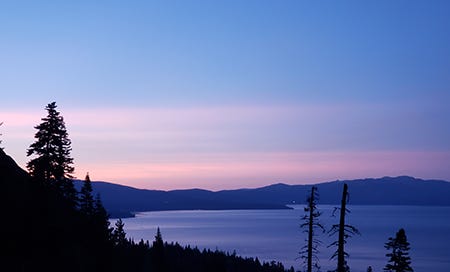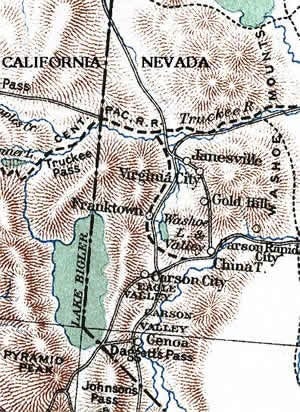THE “hideous, discordant syllables” of “Tahoe,” says Mark Twain, “create a “spoony, slobbering, summer-complaint of a name.”
“Mock gibberish,” trumpets the Nevada Appeal.
On the contrary, says Henry C. Watson in the Sacramento Union in the 1850s.
“Tahoe is a good name for the queen of mountain lakes; not because it is either high-sounding, musical or, in any of its several constructions, peculiarly appropriate, but because it is distinctive; there is but one Tahoe in the world. In a country which multiplies Romes, Troys and Uticas, christens peaks, rivers and valleys to honor the political pets of a day, and desecrates nature by the frequent bestowal of names unfit to be mentioned in circles having a moderate regard for decency, this is a boon.”
Arguments over the name for Lake Tahoe begin as soon as explorer John C. Frémont labels it in 1844 “the Mountain Lake.” Competitors include Big Truckee Lake, Fremont’s Lake, Maheon Lake, Tula Tulia Lake, Sierra Lake, and the preference of Frémont’s cartographer, Lake Bonpland (for the French botanist in South America).
The early winner, “Lake Bigler,” honors California governor John Bigler. It is put forward by legislator John Calhoun “Cockeyed” Johnson, the onetime mailman who blazed Johnson’s Cutoff (Johnson Pass) over Echo Summit. The rancher is impressed by how the portly politician leads a rescue expedition in 1852 for emigrants trapped in snow near “Mountain Lake.”
“Lake Bigler” also wins the approval of William M. Eddy, the state surveyor general in 1863 (and namer of Eddy Street when the noted boozehound served earlier as San Francisco’s city surveyor). The name is confirmed by the California legislature in 1854.
Governor Bigler, a Free Soil Democrat originally from Pennsylvania, is otherwise remembered, if at all, for his anti-Chinese bigotry, his opposition to any restraints on mine owners, and his reputation for quaffing beer by the quart. After his second term in office, the bibulous Sacramento lawyer becomes an ardent advocate of Dixie slavery, the Confederate secession, and a proposed pro-slavery Republic of the Pacific.
During the Civil War, “Lake Bigler” offends Unionists.
According to one account, manager Robert Dean of a lakeside resort hopes to change the name. He asks Captain Jim of the Walker River tribe to speak the Washoe term for the lake. “Tahoo,” he is reported to have answered. A typographical error in the Sacramento Union changes it to “Tahoe.” That’s the story.
The Civil War objections prompt William Henry Knight, chief federal mapmaker in San Francisco for the Interior Department, to ask newspaperman Henry DeGroot to suggest a non-Copperhead name. A correspondent for the Union, he proposes “Tahoe.”
The Rev. Thomas Starr King gets involved. The charismatic abolitionist says “Tahoe” stems “from the Washoe Indian 'Tache' (Much Water) plus 'Dao' (Deep or Blue Water).”
Sam Clemens, now signing his dispatches as Mark Twain, is so entranced with the lake’s beauty that he scribbles a rant for the Territorial Enterprise in Nevada’s Virginia City.
“I hope some bird will catch this Grub the next time he calls Lake Bigler by so disgustingly sick and silly a name as ‘Lake Tahoe,’ he writes. “Of course, Indian names are more fitting than any others for our beautiful lakes and rivers, which knew their race ages ago, perhaps, in the morning of creation, but let us have none so repulsive to the ear as ‘Tahoe’ for the beautiful relic of fairy-land forgotten and left asleep in the snowy Sierras when the little elves fled from their ancient haunts and quitted the earth.”
He concludes, “ ‘Tahoe’ – it sounds as weak as soup for a sick infant. ‘Tahoe’ be – forgotten!”
The screed is ineffective. Without seeking assent from the California or Nevada legislators, the U.S. General Land Office goes along with mapmaker Knight’s recommendation of “Lake Tahoe” for all federal maps and documents.
Five years after Appomattox, California Democrats with Dixie sympathies outnumber Republicans in the state Capitol. They reaffirm “Lake Bigler.”
The feds pay no attention.
Not until 1945 will the state’s legislators finally accept Tahoe as the official name.
Eighty-two years had elapsed since the Sacramento Union had commented that Lake Bigler might be a suitable name.
But only, the editor adds, “if a lake of beer is discovered.”
-30-
Notes
“Life interfered.” Such is the managing editor’s excuse for a three-week gap in posts by True Yarns, Ltd. He has been suspended. On hold is an appreciative reminiscence for photographer Fran Ortiz. Next: “The Princess and the Flog,” Act 4 in the series of “Daring Divas of the Limelights.”
True Yarns is indebted to Charlie Cardillo and to Maureen Mroczek Morris, co-author with Lynn Ludlow of their forthcoming historical biography, Big Ralph: Poles Apart in Old Californy, Land of the Gold and the Fleas.
Comments, good and bad, are encouraged.
Sources
Henry C. Watson. “A Cruise on a Mountain Sea.” Sacramento Daily Union, July 28, 1866.
Edward B. Scott. The Saga of Lake Tahoe, Vol. 1. Antioch, California: Sierra-Tahoe Publishing Co., 1957.
Mark Twain. “Bigler vs. Tahoe.” Territorial Enterprise, Virginia City, Nevada, September 4-5, 1863, and February 12, 1864.
William Mero. “Contra Costa County and How Lake Tahoe Got Its Name.” Contra Costa County Historical Society. Online: http://www.cocohistory.org/essays-bigler.html.
Erwin G. Gudde. California Place Names. Berkeley: University of California Press, 1969.
Barbara Lekisch. Tahoe Place Names: The Origin and History of Names in the Lake Tahoe Basin. Lafayette, California: Great West Books, 1988.






My favorite quote about naming Tahoe should apply to all things nature has gifted us:
“In a country which multiplies Romes, Troys and Uticas, christens peaks, rivers and valleys to honor the political pets of a day, and desecrates nature by the frequent bestowal of names unfit to be mentioned in circles having a moderate regard for decency, this is a boon.”
Bigler Lake named after the temperamental political winds of the day, and a secessionist racist, Tahoe’s name can tangentially be understood as a mid-19th century cancel. Who knew?
Wow! Didn't know any of this. Tahoe is a beautiful name for a beautiful place. And unique.